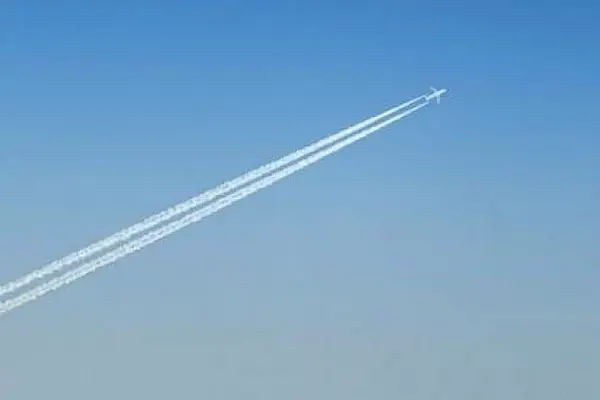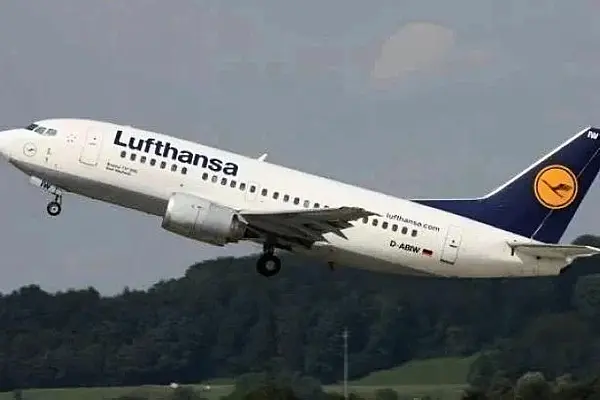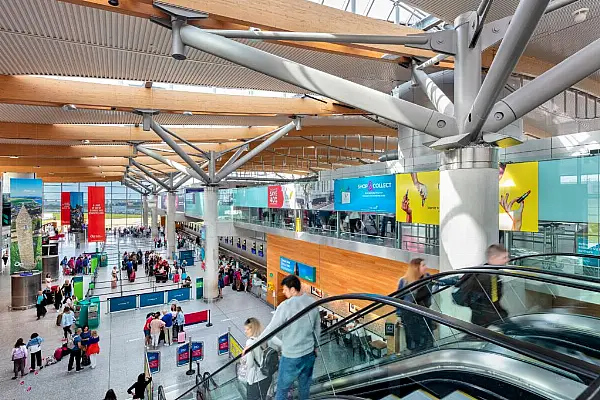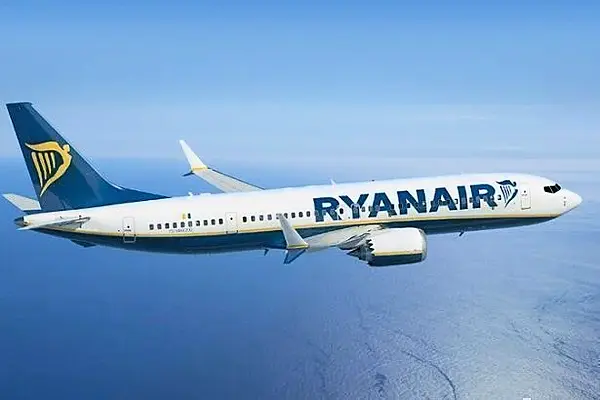Hospitality Ireland presents a round-up of the latest airline and aviation news from around the world.
Boeing Raises Jet Demand Forecast
Boeing revised up long-term demand forecasts on Tuesday September 14, as a snapback in commercial air travel in domestic markets like the United States tempers the more gloomy industry predictions seen at the height of coronavirus lockdowns last year.
The rosier view underpins moves by the aerospace giant to prepare for growth in travel demand and military services, even as its own ability to respond to the brighter outlook remains hampered by industrial delays and the lingering 737 MAX crisis.
The US plane maker, which dominates jet sales together with Europe's Airbus, forecast 43,610 commercial jet deliveries over the next 20 years worth $7.2 trillion, an increase of 500 units from the 43,110 projected a year ago.
On a shorter 10-year view, which is more sensitive to the severe fallout on airlines from the COVID-19 pandemic, Boeing sees 19,330 deliveries, up from last year's forecast of 18,350.
The 10-year projection is 6% shy of the forecast it published in 2019, but the drop from pre-crisis levels has narrowed from 11% a year ago.
"One of the strongest reasons for confidence is how quickly we have seen a bounce-back in domestic travel in the last 12 months," Boeing Chief Strategy Officer Marc Allen told reporters.
Boeing sees domestic flying at pre-crisis levels in 2022 followed by regional traffic in 2023 and international in 2024.
Demand for airliners is seen as a bellwether for the wider economy. Boeing raised its assumption for average annual global economic growth to 2.7% from 2.5% from last year's forecast.
Boeing and other plane makers are predicting that environmental pressure and COVID-19 will accelerate the retirement of jets, leaving room for new planes in the market.
But several analysts have raised concerns about the unpredictable spread of coronavirus variants and ongoing travel restrictions, even as vaccination rates steadily increase.
Boeing's forecast for annual passenger traffic growth was unchanged at 4%, although the growth rate has edged lower since 2015 from the once-reliable 5% as a record aviation boom peaked.
Over the next decade, Boeing sees demand for $9 trillion of goods and services in the full array of markets it operates in, from freighters to fighters, up from $8.7 trillion a year ago.
Its defense and space forecast is flat at $2.6 trillion.
The shift of emphasis toward services comes as mounting budget pressures are expected to limit arms spending and further prolong the use of systems already in the U.S. arsenal. Boeing last year began delivering refurbished and modified F/A-18 jets.
Boeing slightly increased its 20-year forecast for deliveries of twin-aisle models like its 787 Dreamliner and the Airbus A350 to 7,670 jets, up from 7,480 previously.
The segment remains the hardest hit by the crisis as widespread border restrictions choke international air travel.
Boeing is currently grappling with a halt in 787 deliveries due to production problems, cutting off a key source of cash.
For medium-haul single-aisle jets like its 737 MAX - the industry's No. 1 cash cow - Boeing sees 32,660 deliveries over the next 20 years, up from the previous 32,270.
Boeing's 737 MAX returned to service late last year after a nearly two-year safety ban. It recently won approval in India, although a lingering ban in China raises uncertainty.
Boeing also cut its 20-year forecast for freighter demand to 890 jets from the 930 it projected a year ago.
Demand for freighters has soared during the pandemic as shippers sought alternatives to the belly space of passenger jets, left on the ground due to weak travel demand. Both Boeing and Airbus are proposing to develop new all-cargo planes.
Boeing Delivers 22 Jets In August; 737 MAX 'White Tails' Nearly Gone
Boeing Co delivered 22 airplanes in August amid revived domestic travel and won orders for seven 787s in a respite for a program hobbled by industrial defects and a halt in deliveries.
The closely watched monthly snapshot comes as Boeing tries to recoup billions of dollars in lost sales from the coronavirus pandemic, and move beyond a safety scandal caused by two fatal 737 MAX crashes.
Of the 22 jetliners delivered last month, 14 were 737 MAX passenger jets and two were P-8 maritime patrol aircraft.
The remaining six jets were widebodies, including three KC-46 tankers for the U.S. Air Force.
For the year to date, Boeing has delivered 206 aircraft.
European rival Airbus delivered 40 jets in August to reach 384 since the start of the year.
Through August, Boeing had delivered 169 of its best-selling 737 MAX jets since that aircraft returned to service in late 2020 following a nearly two-year safety ban.
Crucially, Boeing has virtually eliminated a stockpile of up to 200 unwanted jets known in the industry as "white tails," left by the MAX crisis, according to industry sources.
But it is grappling with structural defects in its bigger 787, which have caused it to cut production and halt deliveries.
Boeing nonetheless struck an optimistic note with higher industry forecasts on Tuesday, citing a recovery in domestic markets, although international travel remains depressed and coronavirus variants pose potentially new risks.
Boeing said it received orders for 53 aircraft in August, including 35 MAX and 18 widebody aircraft.
Those include 11 777 freighters - one for FedEx Corp and 10 more from a buyer or buyers Boeing declined to identify.
Total orders for August, after cancellations and conversions, stood at 23.
That brings orders for the year so far to 683 or 280 after cancellations, ahead of Airbus' net total of 132.
Industry sources said Boeing is close to winning an order for some 70-100 737 MAX jets from India's Akasa, a budget startup founded by billionaire Rakesh Jhunjhunwala, pending separate talks on a long-term engine service deal.
But it remains in a dispute with Irish budget airline Ryanair, one of its biggest customers, over the pricing of a potential order for up to 250 MAX jets as demand for new airliners picks up in Europe.
Ryanair says it is not prepared to bow to Boeing's pricing demands amid uncertainty over COVID-19 trends and suspended talks last week.
Market sources say Boeing has signalled more confidence on prices after securing orders from United Airlines and others, and after finding homes for all but 20 of the "white tails".
European sources accuse Boeing of slashing prices aggressively to win deals, a charge it denies.
Asked on Tuesday September 15, about supplies of MAX jets, Stephen Jones, chief executive of Flair Airlines, told Reuters in Montreal, "I think it has tightened up quite a lot." The airline secured MAX jets at what he called a "great price" in March.
Court Grants AirAsia X Extension To Hold Creditors Meeting By March
Malaysia's long-haul budget carrier AirAsia X Bhd (AAX) has obtained court permission to extend the deadline to convene its creditor meetings to March next year, it said on Wednesday September 15.
AirAsia X said the High Court granted an order for an extension until March 17 for it to convene separate meetings of the creditors "for the purpose of considering and, if thought fit, approving with or without modification" a restructuring scheme to be proposed.
In February, it was granted court approval to convene the separate meetings with different groups of creditors to vote on its proposal within 180 days.
The court had separated the airline's 14 creditors into three classifications - the first for airport operator Malaysia Airports Holdings Bhd, the second for other creditors, and the third for planemaker Airbus SE.
AAX, an affiliate of AirAsia Group, proposed last October to restructure 64.15 billion ringgit of debt and has faced objections to its scheme from some creditors.
The airline said the alternative was liquidation with no returns to creditors. AAX will need approval from creditors at the meetings holding at least 75% of the money owed.
India Gets Bids For Sale Of Loss-Making Air India
The Indian finance ministry said on Wednesday September 15 that the debt-laden state-run airline Air India has received financial bids for its privatisation process.
"Financial bids for Air India disinvestment received by Transaction Adviser," Tuhin Kanta Pandey, secretary, Department of Investment and Public Asset Management, said in a tweet.
"Process now moves to concluding stage," he said.
The government will soon announce the floor price for the sale of Air India, a senior government source, who declined to be identified, told Reuters.
India's Tata Sons said it had submitted a bid for Air India, while local media reported that SpiceJet also submitted a bid.
SpiceJet and Air India did not immediately respond to a Reuters request for comment.
Prime Minister Narendra Modi's government has renewed a push to sell its entire interest in the loss-making airline, which has been kept aloft by a bailout since 2012.
The government loses nearly 200 million rupees every day to run the national carrier, which has accumulated losses of over 700 billion rupees ($9.53 billion), officials said.
An effort to auction a majority stake almost three years ago drew no bids, forcing the government to ease terms. It has also extended the deadline multiple times due to COVID-19 and further eased the terms to attract bidders.
Lufthansa Putting On More Business Flights, Says CEO
Lufthansa is putting on more flights for business travellers in September and October, the chief executive of the German airline told Reuters on Wednesday September 15.
"We are now seeing very clearly that business travellers are coming back," Carsten Spohr said, adding Lufthansa had increased capacity on domestic flights by 30% in September and would increase it by another 15% in October.
Lufthansa will reintroduce the hourly frequency of flights between Frankfurt and Hamburg and Frankfurt and Berlin in the mornings and evenings, times popular with business travellers.
"In Europe, we are already flying 60 percent of our programme again," Spohr said.
Business travel is seen only returning gradually after it collapsed during the coronavirus pandemic as many companies have slashed their travel budgets and have got used to holding meetings online.
Speaking on the sidelines of a conference in Berlin, Spohr said the air cargo business was booming.
"In air freight, due to the major unprecedented bottlenecks in global supply chains, the boom has even increased since the end of the summer holidays," he said.
Air New Zealand Studying How To Add Low-Emissions Planes To Its Fleet
Air New Zealand Ltd said on Thursday September 16 that it was studying how it could use low-carbon technologies like electric, hybrid or hydrogen powered planes to dramatically reduce emissions from shorter and regional flights as soon as 2030.
The airline signed a memorandum of understanding with Airbus SE to research the impact hydrogen planes would have on Air New Zealand's network, operations and infrastructure.
Airbus said it is hoping to bring a hydrogen plane to market by 2035 - a goal some industry officials and analysts believe to be ambitious.
This agreement brings us a step closer to "seeing low carbon solutions in place for our shorter domestic and regional flights in the next decade," said Air New Zealand Chief Executive Greg Foran.
Airbus has already struck similar hydrogen study deals with easyJet and SAS in Europe as airlines around the world look to meet ambitious emissions targets in line with government commitments.
Aviation accounts for around 2.5% of global carbon emissions.
The European manufacturer said the agreement with Air New Zealand would help it gather feedback on airlines' expectations and preferences for configuration and performance for zero-emissions planes.
"We are also talking to several airlines on similar studies," said a Airbus spokesperson.
It is the latest environmental technology initiative for Air New Zealand, which in 2018 partnered with turboprop manufacturer ATR, part-owned by Airbus, to examine hybrid-electric regional aircraft.
Airbus last year unveiled three visual concepts for hyrdogen-powered planes and set itself a deadline of 2035 to put a carbon-free commercial aircraft in service, a target engine makers like Safran have described as ambitious.
The European plane maker says radical technology is needed to help the industry meet climate goals, but US rival Boeing Co is more cautious, saying sustainable liquid fuels will contribute most to efforts to decarbonise the aviation sector because of the infrastructure needed to support hydrogen.
Airbus in June told European Union officials that most airliners will rely on traditional jet engines until at least 2050, with zero-emission hydrogen planes primarily focused on regional and shorter-range aircraft from 2035.
Virgin Australia To Require COVID-19 Vaccinations For Staff
Virgin Australia said on Thursday September 16 that it will require all its staff to be vaccinated against COVID-19, in line with domestic rival Qantas Airways Ltd and a growing number of airlines in the Asia-Pacific region.
Pilots, cabin crew and airport workers will need to be fully vaccinated by Nov. 15, while other staff will have until March 31, 2022, Virgin said, aligning its dates with Qantas.
"We also remain supportive of any government-led measures to ensure travellers are vaccinated," Virgin Chief Executive Officer Jayne Hrdlicka said.
In Australia, lockdowns in Sydney, Melbourne and Canberra due to coronavirus cases have led to state border closures, hampering domestic travel.
The country has not mandated vaccines for travel, but some states require them for entry in certain cases.
Asian airlines have reported high vaccination take-up rates among pilots and cabin crew as they wait for the region's tight pandemic-related border controls to be relaxed.
Singapore Airlines Ltd, Malaysia Airlines and Hong Kong's Cathay Pacific Airways Ltd are among those that have mandated crew vaccinations.
News by Reuters, edited by Hospitality Ireland. Click subscribe to sign up for the Hospitality Ireland print edition.









